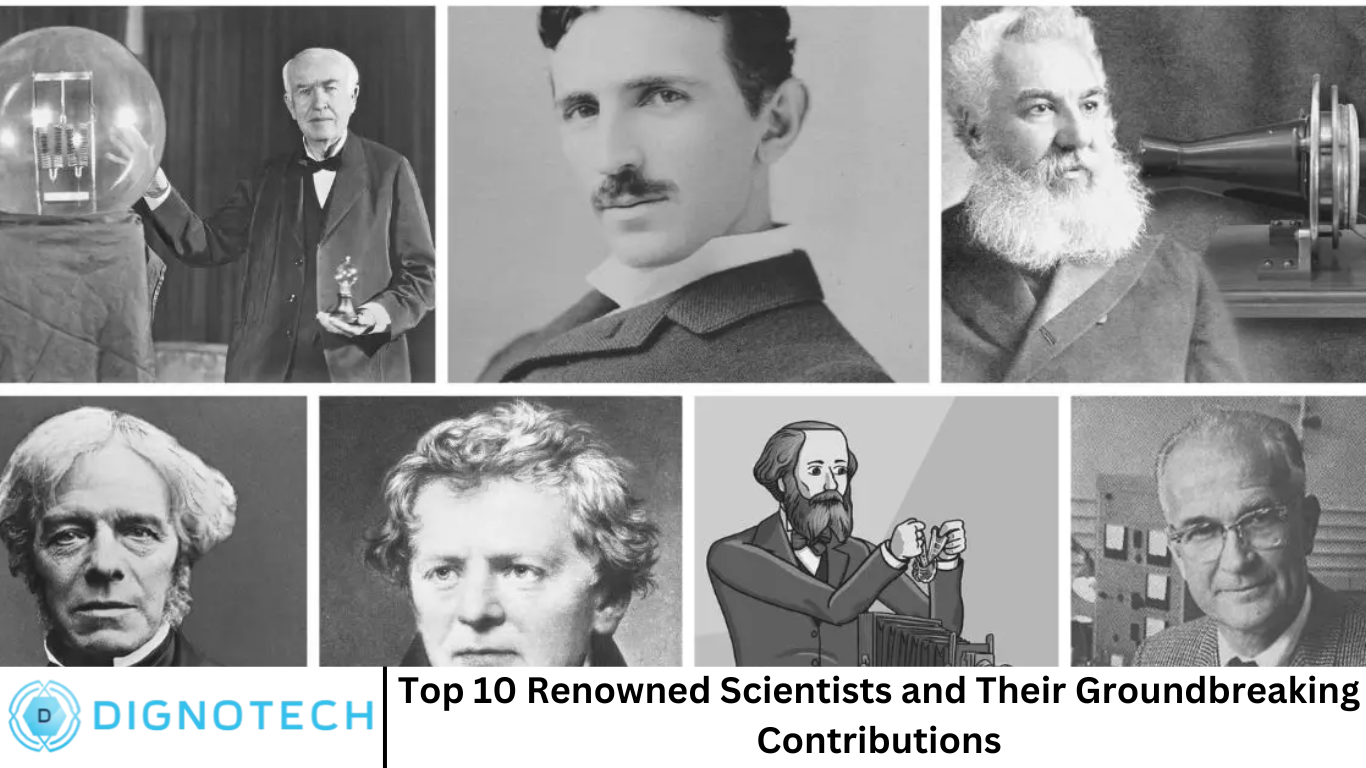Top 10 Renowned Scientists and Their Groundbreaking Contributions

Hi everyone! How are you all doing? Welcome to dignotech.com! Science has evolved dramatically throughout history, largely due to the extraordinary minds who have shaped it. The pursuit of knowledge, understanding the world around us, and improving human life are some of the noble goals these scientists strived for. From the laws of physics to groundbreaking discoveries in medicine, the contributions of these scientists continue to influence us to this day. In this article, we explore the top 10 renowned scientists and their groundbreaking contributions that forever altered the course of history.
Albert Einstein (1879–1955)
Albert Einstein is perhaps the most famous scientist in history. Known for his revolutionary contributions to the field of physics, Einstein’s work fundamentally changed our understanding of space, time, and energy.
Groundbreaking Contributions:
- Theory of Relativity: Einstein’s most famous work, the theory of relativity, includes both the special and general theories of relativity. His equation E=mc2E = mc^2E=mc2, which demonstrates the equivalence of energy and mass, revolutionized the way we view matter and energy.
- Photoelectric Effect: Einstein’s work on the photoelectric effect demonstrated the particle nature of light, which earned him the Nobel Prize in Physics in 1921.
- Quantum Mechanics: Although Einstein is often associated with the theory of relativity, his work on quantum mechanics was pivotal, contributing to the understanding of atomic and subatomic particles.
Isaac Newton (1642–1727)
Sir Isaac Newton was an English mathematician, physicist, and astronomer who is widely recognized as one of the most influential scientists of all time. His work laid the foundation for classical mechanics, which dominated physics until the advent of quantum mechanics and relativity.
Groundbreaking Contributions:
- Laws of Motion: Newton formulated the three fundamental laws of motion, which laid the groundwork for classical mechanics and helped explain how objects move and interact.
- Universal Gravitation: In his work Mathematical Principles of Natural Philosophy (1687), Newton proposed the law of universal gravitation, stating that every particle of matter in the universe attracts every other particle with a force proportional to the product of their masses and inversely proportional to the square of the distance between them.
- Calculus: Although the development of calculus was also independently attributed to Gottfried Wilhelm Leibniz, Newton’s work in this field was groundbreaking, providing the mathematical tools needed to describe change and motion.
Marie Curie (1867–1934)
Marie Curie, a pioneering physicist and chemist, was the first woman to win a Nobel Prize and remains the only person to have won Nobel Prizes in two different scientific fields—physics and chemistry.
Groundbreaking Contributions:
- Discovery of Radioactivity: Curie’s discovery of radioactivity, a term she coined, was one of her most important contributions. Her research led to the discovery of the radioactive elements polonium and radium.
- Advances in Cancer Treatment: Curie’s work on radioactivity laid the foundation for the use of radiation in medicine, particularly in the treatment of cancer.
- First Woman in Science: As a trailblazer for women in science, Curie overcame numerous obstacles to become one of the most respected scientists in history.
Charles Darwin (1809–1882)
Charles Darwin was an English naturalist whose theory of evolution transformed biology. His groundbreaking work provided the framework for understanding how species evolve over time through natural selection.
Groundbreaking Contributions:
- Theory of Evolution by Natural Selection: Darwin’s book On the Origin of Species (1859) proposed that species evolve through a process of natural selection, where the organisms best adapted to their environments are more likely to survive and reproduce.
- Galapagos Islands Observations: Darwin’s observations of finches and other species on the Galapagos Islands were crucial in shaping his theory of evolution, demonstrating how species can adapt to different environments.
- Impact on Modern Biology: Darwin’s theory of evolution has become the cornerstone of modern biology and continues to shape research in genetics, ecology, and anthropology.
Nikola Tesla (1856–1943)
Nikola Tesla was an inventor, electrical engineer, and physicist whose contributions to electrical engineering have had a lasting impact on the development of modern electricity and telecommunications.
Groundbreaking Contributions:
- Alternating Current (AC): Tesla’s development of alternating current (AC) power systems revolutionized the way electricity was distributed, providing a more efficient and cost-effective alternative to direct current (DC).
- Tesla Coil: The invention of the Tesla coil was instrumental in advancing wireless communication and the development of radio technology.
- Wireless Energy Transmission: Tesla envisioned a world where electrical energy could be transmitted wirelessly, and though his ideas were ahead of their time, they laid the groundwork for future innovations in wireless technology.
Galileo Galilei (1564–1642)
Often referred to as the “father of modern science,” Galileo Galilei was an Italian astronomer, physicist, and engineer who made groundbreaking contributions to the scientific revolution.
Groundbreaking Contributions:
- Improvement of the Telescope: Galileo improved the design of the telescope and used it to make astronomical observations that challenged the prevailing view of the universe. His observations of Jupiter’s moons, the phases of Venus, and the rugged surface of the Moon provided strong evidence for the heliocentric model of the solar system.
- Kinematics: Galileo’s studies of motion led to the development of the concept of inertia, which became a fundamental principle in Newtonian physics.
- Support for Heliocentrism: Galileo’s advocacy for the heliocentric model, which posits that the Earth orbits the Sun, put him in direct conflict with the Catholic Church, but his discoveries were pivotal in advancing our understanding of the universe.
Louis Pasteur (1822–1895)
Louis Pasteur, a French biologist and chemist, is best known for his work in the fields of microbiology and immunology. His research led to numerous advancements in medicine and public health.
Groundbreaking Contributions:
- Germ Theory of Disease: Pasteur’s research on the role of microorganisms in disease led to the development of the germ theory, which changed the way we approach sanitation, hygiene, and disease prevention.
- Pasteurization: Pasteur’s development of the pasteurization process, which involves heating liquids to kill harmful microorganisms, revolutionized the food and beverage industry, particularly in the production of milk and wine.
- Vaccines: Pasteur developed vaccines for diseases such as rabies and anthrax, saving countless lives and laying the foundation for modern immunology.
Stephen Hawking (1942–2018)
Stephen Hawking, a theoretical physicist, cosmologist, and author, is best known for his work on black holes and his contributions to our understanding of the universe.
Groundbreaking Contributions:
- Hawking Radiation: One of Hawking’s most significant contributions was his prediction that black holes emit radiation, now known as Hawking radiation, which has profound implications for our understanding of black holes and the nature of the universe.
- The Theory of Black Holes: Hawking’s work on the properties of black holes, including the idea that they are not completely black and can emit radiation, revolutionized the field of theoretical physics.
- Popularizing Cosmology: Through his book A Brief History of Time, Hawking brought complex scientific concepts to the general public, making cosmology and theoretical physics more accessible.
Dmitri Mendeleev (1834–1907)
Dmitri Mendeleev was a Russian chemist who is best known for creating the periodic table of elements, which organized elements based on their atomic weights and properties.
Groundbreaking Contributions:
- Periodic Table: Mendeleev’s periodic table, which arranged elements in rows and columns according to their atomic masses, revealed that elements with similar properties occur at regular intervals. His predictions about undiscovered elements were later confirmed, demonstrating the predictive power of his periodic table.
- Periodic Law: Mendeleev’s periodic law laid the foundation for modern chemistry, providing a framework for understanding the relationships between the chemical elements.
Alexander Fleming (1881–1955)
Alexander Fleming was a Scottish bacteriologist best known for discovering the first antibiotic, penicillin, which revolutionized the treatment of bacterial infections.
Groundbreaking Contributions:
- Discovery of Penicillin: Fleming’s discovery of penicillin in 1928 marked the beginning of the antibiotic era, saving millions of lives by providing a treatment for previously deadly bacterial infections.
- Impact on Medicine: Fleming’s discovery paved the way for the development of other antibiotics, which have become essential in modern medicine.
- Antimicrobial Resistance: While his discovery revolutionized healthcare, it also brought attention to the problem of antimicrobial resistance, an ongoing challenge in medicine.
Frequently Asked Question
What are the major contributions of Albert Einstein to science?
Albert Einstein’s major contributions include the theory of relativity, the equation E=mc2E = mc^2E=mc2, and his work on the photoelectric effect. These laid the foundation for modern physics and quantum mechanics.
How did Isaac Newton contribute to our understanding of physics?
Isaac Newton formulated the laws of motion and the law of universal gravitation, which explained how objects move and interact. These laws were crucial for the development of classical mechanics.
What is Marie Curie most famous for?
Marie Curie is famous for her pioneering research on radioactivity, including the discovery of the elements polonium and radium. She also developed techniques for isolating radioactive isotopes.
How did Charles Darwin change the field of biology?
Charles Darwin introduced the theory of evolution by natural selection, fundamentally changing the way we understand the development of life on Earth and the interrelationship of species.
What did Nikola Tesla invent?
Nikola Tesla is best known for his development of alternating current (AC) electricity and his inventions, including the Tesla coil and early work in wireless communication.
What was Galileo’s contribution to astronomy?
Galileo Galilei improved the telescope and used it to make groundbreaking astronomical observations, including the discovery of Jupiter’s moons, which supported the heliocentric model of the solar system.
What impact did Louis Pasteur have on medicine?
Louis Pasteur’s work on germ theory revolutionized medicine, leading to improved hygiene and sanitation practices. He also developed the process of pasteurization and created vaccines for diseases like rabies and anthrax.
Conclusion
These top 10 renowned scientists have left an indelible mark on the world through their groundbreaking contributions. From the laws of physics and the theory of evolution to medical advancements and the discovery of new elements, their work continues to shape the course of scientific progress. Their legacy reminds us of the importance of curiosity, perseverance, and a willingness to challenge conventional ideas in the pursuit of knowledge.




